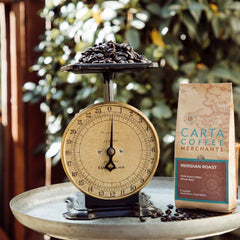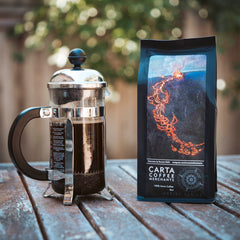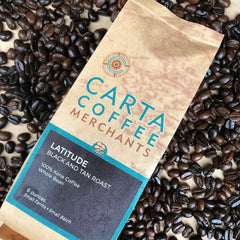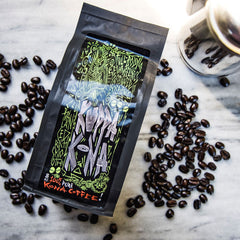Posted on

If you’re like most coffee drinkers, few moments feel better than slurping down that hot, frothy brew first thing in the morning—especially once those buzzy caffeine vibes start kicking in.
But have you ever stopped to think: What exactly is caffeine doing to our bodies? Even if we love the feeling, is it healthy?
According to Villanova University, over 90% of American adults drink caffeine in some form every day, and over half consume more than 300 milligrams. This easily makes it the most popular drug in the United States.
That’s right. Caffeine is a drug. Even if it’s milder than many other mind-altering substances, that doesn’t mean we shouldn’t think about how our bodies react and what side effects caffeine can cause.
From discovering why your cup of coffee makes your heart pound a bit faster—to whether ingesting too much can actually kill you—let’s dig into what caffeine actually does inside of us.
What Does Caffeine Do To My Brain?
We all welcome that jolt of energy felt after downing a cup of coffee—but what exactly is caffeine doing to our mind to make us more alert and awake?
Caffeine affects the mind largely thanks to how the chemical interacts with various brain neurotransmitters. Most notably, caffeine blocks the flow of a molecule called adenosine, which makes us increasingly drowsy throughout the day.
As precisely the same size and shape as adenosine, caffeine mimics this sleep-inducing molecule and blocks the real thing from processing. Since the brain’s receptors aren’t picking up cues to feel sleepy, our brain instead perks up and we feel ready to tackle whatever the day has in store.
Also, since energy and alertness boost our ability to complete tasks quickly and efficiently, we often associate this buzz with the joys of accomplishment. As doing things well instills confidence, coffee drinkers start tying this positive feeling with achievement and ultimately, a good mood.
How Does Caffeine Affect My Heart?
Caffeine is a stimulant. As caffeine is absorbed through the stomach, it’s then relayed to the central nervous system which tells the body’s functions to speed up. Just like it did to the brain, caffeine now tells your heart to beat faster as well.
The acceleration of the heart and circulatory system leads to quicker blood flow, rapid heart beat, higher body temperature, etc., which boosts many desirable effects including energy, concentration and mood.
However, ingest too much caffeine and you might experience the less desirable feelings. As your heart speeds up, some people can experience heart palpitations, high blood pressure, jitteriness, anxiety, etc.
Why Does Caffeine Speed Up My Digestion?
If you’ve been drinking coffee long enough, you’ve likely noticed how downing your cup leads to more bathroom breaks. But have you ever stopped to think why?
Caffeine is a diuretic. This means the chemical tells your body to release more liquids than it takes in. Therefore, you’re going to urinate more often. Though a small amount of caffeine may not notably speed up your need to pee, drinking more than a cup a day typically leads to more bathroom trips.
And what about number two? Since caffeine is also a stimulant, it gives the signal throughout the body to start working overtime—and that includes your digestive tract and colon. We’ll let you fill in what happens next.
How Much Caffeine is Too Much Caffeine?
So, what does happen if you drink a small amount of caffeine vs. a large amount? The answer is—it depends. After all, every body is different. I’m sure you know someone who can chug a quadruple espresso then fall fast asleep whereas a single cup might keep you up for days.
With just the right amount of caffeine, most people can expect to feel energized, focused and more positive about the day ahead—all those uplifting senses that made us fall in love with this chemical in the first place.
However, if you’re like most caffeine consumers, you also know the feeling of drinking one cup too many. But what does count as too much caffeine?
According to the Mayo Clinic, most adults can safely consume up to 400 milligrams of caffeine daily. That’s about 4 regular cups of coffee, although it obviously depends on the size and caffeine content of the particular brew.
Still, always listen to your body. If you’re getting signs that you’re consuming too much caffeine, take a break. These signs might include:
- Insomnia
- Headaches
- Irritability
- Jitteriness
- Anxiety
- Stomach upset
- Heartburn
- Heart palpitations
- Rapid heartbeat
Though caffeine side effects might be frustrating, dying from a caffeine overdose—especially from drinking coffee alone—is rare, though technically not impossible. Every year, a few deaths linked to caffeine overdoses are reported due to massive amounts of the stimulant causing cardiac arrest.
However, the far majority of these deaths are tied to people ingesting powdered caffeine or several strong energy drinks, and all victims consumed well over 400 mg in a very short amount of time. As long as you’re using common sense, drinking too much caffeine may leave you with the jitters, but you won’t be a death-by-caffeine victim.
Ready to feel that beautiful, caffeine buzz via our favorite morning brew? Try Carta Coffee Merchants! Made from 100% Pure Kona Coffee, our beans are hand-harvested and hand-roasted on our family farm on the Big Island of Hawaii. Taste the Carta Coffee difference in your own home and order a bag today.













